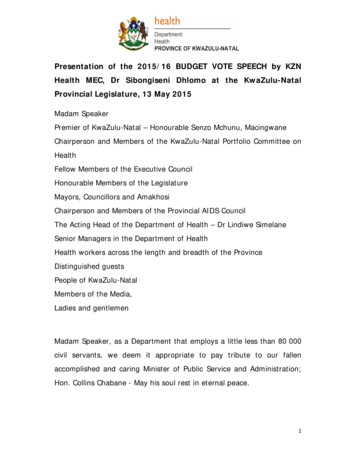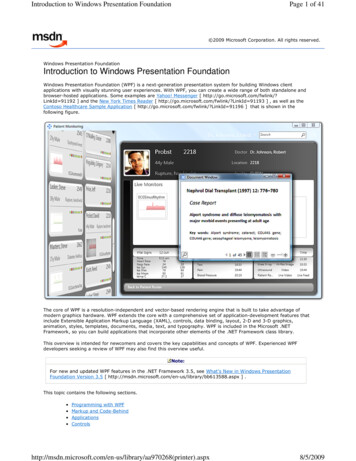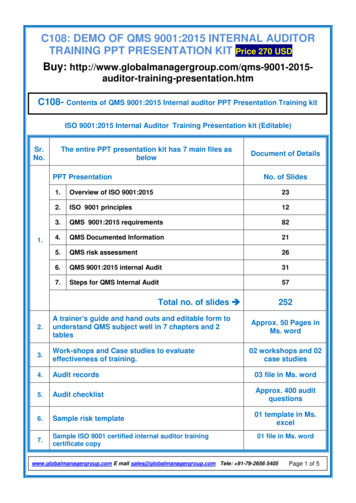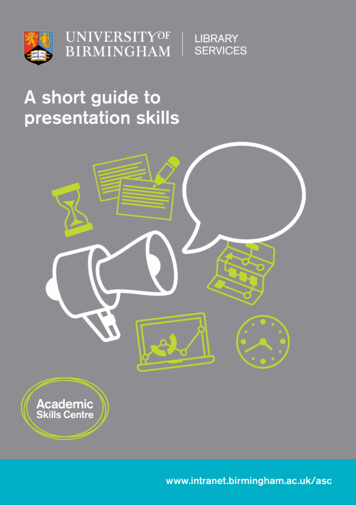
Transcription
Presentation of the 2015/16 BUDGET VOTE SPEECH by KZNHealth MEC, Dr Sibongiseni Dhlomo at the KwaZulu-NatalProvincial Legislature, 13 May 2015Madam SpeakerPremier of KwaZulu-Natal – Honourable Senzo Mchunu, MacingwaneChairperson and Members of the KwaZulu-Natal Portfolio Committee onHealthFellow Members of the Executive CouncilHonourable Members of the LegislatureMayors, Councillors and AmakhosiChairperson and Members of the Provincial AIDS CouncilThe Acting Head of the Department of Health – Dr Lindiwe SimelaneSenior Managers in the Department of HealthHealth workers across the length and breadth of the ProvinceDistinguished guestsPeople of KwaZulu-NatalMembers of the Media,Ladies and gentlemenMadam Speaker, as a Department that employs a little less than 80 000civil servants, we deem it appropriate to pay tribute to our fallenaccomplished and caring Minister of Public Service and Administration;Hon. Collins Chabane - May his soul rest in eternal peace.1
Our 2015 Budget Presentation coincides with the celebration of 60 yearsof the Freedom Charter, whereby our forbearers articulated thefollowing ambition for health care delivery in our country:“A preventative health scheme shall be run by the state;Free medical care and hospitalisation shall be provided for all, withspecial care for mothers and young children ”This pronouncement by our people in 1955 is in place. We just need toaccelerate it. We need to strengthen it; National Health Insurance is ourchosen vehicle to just do that.Madam Speaker, this presentation also coincides with the tabling of ourcountry’s report that will be presented by our President, Hon JacobZuma, at the General World Assembly on progress made by South Africain achieving the Millennium Developmental Goals.Today’s presentation is also in line with the National Development Plan(NDP) 2030 and provides a summary of how the Department, throughOperation Sukuma Sakhe and targeted health interventions, hasmade significant strides in improving the lives and wellbeing of ourcitizens.The NDP envisages that by 2030, South Africa should: Increase life expectancy to 70 years for men and women, Have a generation of under-20s largely free of HIV, Drastically reduce the quadruple burden of disease, Reduce infant mortality rate of less than 20 deaths per thousandlive births, and Reduce under-five mortality rate of less than 30 per thousand.2
All our efforts and strategies then are geared towards the achievementof these objectives and realising our mandate as the Department ofHealth, which is the attainment of a “Long and Healthy life for all SouthAfricans.”To achieve this goal, the Department determined evidence-basedstrategies and plans to address the quadruple burden of disease inKwaZulu-Natal. This includes:1. A maturing and generalized HIV and AIDS epidemic;2. High levels of tuberculosis;3. High maternal and child mortality; and4. Violence and injuries and,5. Increased incidence of non-communicable diseases.Under the theme: “Moving Health care forward in KZN” and workingclosely with our partners and communities, we have been able to makesignificant progress in improving health outcomes in our Province asproved by empirical evidence.Public Private PartnershipsHIV AND AIDS3
Madam Speaker, KwaZulu-Natal has the highest burden of HIV/AIDS inthe Country with an estimated 1 622 850 citizens living with HIV/AIDS.Although this might seem like an unsurmountable challenge, we canconfidently report that the collective Provincial response contributed tosignificant progress in addressing the HIV epidemic.Pro-activeinnovations to scale up prevention and treatment programmes resultedin positive outcomes that earned the Province international and nationalaccolades with a number of initiatives being used as nationalbenchmarks.During his closing address at the 2000 AIDS Conference in Durban, ourformer President; Nelson Mandela, strongly cautioned:“Aids today in Africa, is claiming more lives than the sum total of allwars, famines and floods, and the ravages of such deadly diseases asmalaria.It is devastating families and communities, overwhelming and depletinghealth care services; and robbing schools of both students andteachers.”Madam Speaker, we are proud to declare that as KwaZulu-Natal we tookheed of Tata Mandela’s warning. When we host the 21st InternationalAids Conference from 17 to 22 July next year; we will be able to tell astory of hope and possibility. Nations of the world will be able to learngood practice models from this Province on how to turn the tide.Working together with all our stakeholders, we were able to: Establish 632 fixed public health facilities that offer ART services.4
Expand the ARV treatment programme to become the largestprogramme in the world with 904 278 patients on treatmentincluding 6 350 children under the age of 15 years. Decrease the Mother to Child Transmission of HIV significantlyfrom 22% in 2008 to 5% in 2010 and to 1, 5% currently.We intend further reducing this to 0, 5% by 2018. Provide counselling and testing to 2 579 763 people through ourHIV Counselling and Testing Campaign. Establish 2 482 High Transmission Areas including Taverns;Shops; Taxi Ranks; Farm areas; Tertiary Institutions; Hostels;Hospitality industries as well as Mines. These sites also serve asCondom Distribution Sites, and in the past financial year, theDepartment distributed 142 199 152 male and 3 400 632female condoms through-out the Province. Initiate Health Services at Taxi Ranks including services forscreening for Minor Illnesses, Sexually Transmitted Infections,Tuberculosis, and HIV; as well as provision of Family Planning/Contraceptive services and Condom distribution. The most recentbeing Ixopo Taxi Association at Harry Gwala District on the 29th ofApril 2015, and Mtubatuba Taxi Rank the following day.Health Services at Taxi Ranks5
Offer Post Exposure Prophylaxis services at 302 public healthfacilities for sexual assault survivors. Unfortunately, we note anincrease in the number of sexual assault cases with a total of11 288 cases reported at public health facilities over the pastyear. Of grave concern is the high number of children that havebeen sexually assaulted.For the period October to December2014, a total of 1 129 out of 3 063 sexual assault cases werechildren under the age of 12 years. Medically circumcise more than 520 000 men and boys in theProvince since the programme was launched by His Majesty theKing as a means to curb the spread of HIV.The Province isparticularly proud to report that no amputation or death wasreported since initiation of the programme.The number ofMedical Male Circumcisions (MMC) increased year-on-year asfollows: April 2010 - March 2011: 37 234 April 2011 - March 2012: 100 700 April 2012 - March 2013: 121 228 April 2013 - March 2014: 134 146 April 2014 - February 2015:(ThefiguresforApril 2014 – March 2015 are still being tallied, andare expected to continue this upward trend)6
Medical Male CircumcisionMadam Speaker, we highly appreciate the guidance and leadership ofour Premier, Hon Senzo Mchunu as the Chairperson of the ProvincialCouncil on AIDS. As a Department, we undertake to utilize our Budgetallocation for the 2015/2016 financial year, to make further progress aswe implement the “Stepping Up the Efforts / S’khuphula Umfutho” HIVEpidemic Response for Kwazulu-Natal Strategy” unveiled by the Premier,Honourable Senzo Mchunu at the Provincial Council on AIDS.Under his mentorship, we have established the 90% Zero NewInfections; 90% Zero Discrimination and 90% Zero Aids-related deathtargets into concrete milestones and end-points by 2020. We will beready to do exactly what the Premier has advised as he has given us atask to: Scale up Medical Male Circumcision; Ensure that all citizens access services for HIV counselling andtesting; Ensure that all clients eligible for ARV treatment are enrolled onthe programme including those with a CD4 count under 500 aswell as all pregnant HIV positive mothers and children under-5years. Ensure that all patients on any treatment regime adhere totreatment requirements.7
Strengthen partnerships with Men’s Forums to increase the uptakeof Medical Male Circumcision especially targeting older males. Target male dominated areas such as Ingula power stations,industrial areas and hostels. Target religious groups including the Nazareth Baptist Church. Work in partnership with youth centers to generate interest ofyouth out of school in MMC. Improve access to MMC in hard to reach areas by making use ofMobile Hospital Units. Popularise and upscale distribution of the coloured and flavouredcondoms that are available from March 2015.Madam Speaker, we are central to the realisation of the quest to endAIDS as pronounced at the end of the 2014 Melbourne Aids Conferenceby Michel Sidibé, in the speech entitled; The Last Climb: Ending Aids,Leaving No One Behind, where he said:‘Today, I am calling for ending AIDS by 2030.My vision for ending AIDS looks like this: voluntary testing andtreatment reaching everyone; everywhere; each person living with HIVreaching viral suppression; no one dies from an AIDS related illness or isborn with HIV; and people living with HIV live with dignity, protected bylaws and free to move and live anywhere in the world.’Madam Speaker; KwaZulu Natal will indeed, accomplish its objectives;thanks to the support of the Deputy Chair of the Provincial Council onAIDS, Mr Mdletshe; the civil society; developmental partners; traditionaland religious leaders and the community members who converge underthe Sukuma Sakhe structures.8
TUBERCULOSISMadam Speaker, substantive effort is being exerted in the quest tocreate ‘A world free of tuberculosis’ with zero deaths, disease andsuffering due to tuberculosis. The high TB/HIV co-infection rate in theProvince, currently estimated at 65%, is however still exacerbated bydelays in diagnoses and treatment of TB in people with HIV. This isbeing addressed through implementation of integrated HIV and TBprogrammes at both community and facility level.In 2014, there were 82 840 notified TB cases with 8 % or 6 710cases being children under the age of 5 years. Ugu, eThekwini andUThungulu reported more than 1000 TB cases per 100 000 population.Madam Speaker, even though our Province has one of the highestburdens of TB in the Country, treatment outcomes show significantimprovement over the years.Through intensified case finding andtreatment support in communities and health facilities, the TBtreatment success rate significantly increased from 55% in2005 to 86.3% in 2013.World TB Day March 2015Targeted TB interventions to reduce the burden of TB in the Provinceinclude:9
Intensifying integrated interventions through Operation SukumaSakhe as well as strengthening partnerships with encetotreatment. Integration of HIV and TB management and initiation ofTB/HIV patients on ARV treatment in the 779 Public Healthfacilities in compliance to the pronouncements made by ourPresident, Hon Jacob Zuma. The introduction of 86 GeneXpert machines in the Provincecontributes greatly towards early diagnosis of TB and MDR-TBwhich allow initiation of TB treatment within 24-48 hours. There are 102 TB defaulter tracing and TB/HIV outreachteams in the Province to improve compliance to TB/HIVtreatment.These teams visit households to provide ‘DirectlyObserved Treatment and Support’ to patients to ensure that theytake medication correctly especially those patients with drugresistant TB who stay on treatment for 24 – 36 months. Plans for this current financial year include a training programme,through the John Hopkins University, for 40 Professional Nurses toinitiate patients on MDR-TB treatment.At the moment, 9Professional Nurses, based at Murchison and Vryheid Hospitals,are trained to initiate patients on MDR-TB treatment.Madam Speaker; allow me to pause and commend, appreciate andacknowledge the unwavering support given by our partners bothnationally and internationally that has resulted in the following tangibleimprovements: A decline in HIV incidence from an estimated 3.8 % in 2005 to 2.3% in 2008;10
Reduction in reported HIV and AIDS related deaths from 67 429 in2008/09 to 54 337 in 2010/11; Reduction of Mother to Child transmission from 22 % in 2008 to1.5 % currently; TB treatment success rate in 2008 was at 73% and at 84% in2013; Improvement of life expectancy from 54 years to 60 years; as wellas, More than 900 000 patients put on ART in KwaZulu-NatalIndeed, our combined efforts have culminated in almost 65 000deaths in KZN being avoided.MATERNAL HEALTHAs we approach the end of the Millennium Developmental Goalsdeadline, we are concerned about maternal mortality that remains highin the Province although significant progress has been made in reducingthe number of maternal deaths with the predominant contributing factorstill remaining HIV and AIDS.The number of maternal deaths in public health facilities shows a steadydecline, from 363 in 2011/12 to 274 in 2014/15 (end of January2015).The following interventions are currently being implemented to furtheradvance maternal health outcomes: Established Provincial Specialist and District Clinical SpecialistTeams to improve the quality of clinical care through mentorshipand supportive supervision. We currently have 47 of these11
professionals deployed throughout the Province, out of 219countrywide. Have 277 Trainers and Mentors on the Essential Steps in theManagement of Obstetric Emergencies (ESMOE) to improve labourand delivery outcomes. Introduced Siyanqoba, a Quality Improvement Programme, inall labour wards to improve the quality of maternal care duringlabour and use of a Partogram to identify emergencies. Intensifying the promotion of Mom–Connect, a regular SMS serviceon various health topics related to pregnancy and child care, rpregnancy. The service also registers complaints and complimentsfrom clients with the National Office.Presentation by the National Minister of Health, Dr Aaron Motsoaledi at thelaunch of Mom‐Connect in KwaZulu‐Natal Providing Family Planning/ Contraceptive services in all PublicHealth facilities including the rollout of reversible Implanon toaddress unwanted and high risk pregnancies, teenage pregnancyand unsafe abortions.12
Using Operation Sukuma Sakhe as vehicle to promote andensure early attendance of ante natal care services by pregnantmothers, which impacts positively on the Prevention of Mother toChild Transmission [PMTCT] Programme. Deploying Community Care Givers to promote the 6X6X6 PostNatal Care Principle. Here every pregnant woman at antenatal careis linked to a CCGs in their area of residence. After delivery, theCCG is notified that the mother has been discharged so that shecan be visited and monitored. elerate Reduction of Maternal and Child Morbidity andMortality in Africa (CARMMA). In this respect, we haveestablished 26 Mothers’ Lodges in our Public Health Facilities, withspecial emphasis to rural areas; i.e.: Niemeyer Hospital in Amajuba; Qadi Clinic; Halley Stott Clinic and Osindisweni Hospital ineThekwini; St Appollinaris and Rietvlei Hospitals as well as Pholela Clinic inHarry Gwala; Montebello and Ntunjambili Hospitals in ILembe, GJ Crookes Hospital and Turton CHC in Ugu; Appelsbosch Hospital in UMgungundlovu; Mosvold and Mseleni Hospitals in UMkhanyakude;13
Greytown Hospital and Douglas Clinic in UMzinyathi; Ladysmith Hospital, Escourt Hospital and Emmaus Hospital inUThukela, Catherine Booth; Ekombe and Nkandla Hospitals in UThungulu; Ceza and Vryheid Hospitals in Zululand.Furthermore, I will be leading a campaign against illegal abortionsin this Province. Members would note the proliferation of theadvertisements on the lamp-posts and electric boxes promising safe,quick and pain free abortions. All these are illegal abortions and there isnothing safe about them; instead they pose a health risk to the youngmothers and women in our country. With our campaign, we thus aim: To bring together groups, networks, movements and organizationsfrom around the Province to work together in anti-illegal backstreet abortion campaign; s,governments, civil society officials and human rights bodies; To promote the legitimacy of the right to safe abortion and alsopromote initiatives on safe motherhood and family planning. To promote young women's leadership in the campaign at alllevels. To develop and disseminate key messages to counter the influenceof the anti-choice movement and reclaim the language of abortionas a moral decision.14
We will kick start this campaign with a march on “Anti-Unsafe Abortion”with all Hospital management accompanied by nursing college studentsin their white uniforms, South African Police Services personnel and civilsociety servants. The success of this campaign also depends onpartnerships with South African Police Services and National ProsecutingAuthority. I therefore would like to take this opportunity to extend theinvitation to the Security Cluster to participate in this importantcampaign in order to help bring an end to this onslaught on our youngmothers.CHILD HEALTHMadam Speaker, we are working with the Department of Home Affairsto ensure that all children born in our hospitals leave the facility withBirth Certificates.Visit by Minister of Home Affairs, MrMalusi Gigaba15
Also as means to address child health outcomes, we launched the PhilaMntwana programme, which primarily focusses on early detection ofmalnutrition and TB in children under the age of 5 years.We utilize Operation Sukuma Sakhe war rooms in wards to providecomprehensive health promotion services. Screening for malnutrition atcommunity level is being done using Mid Upper Arm Circumference(MUAC) and those found wanting are referred to clinics.This is a measurement tool used to make detection of growth falteringand growth failure of children in the community and at PHC level verysimple. It is colour coded into Green; Yellow and Red. If the child ismeasured at Yellow mark, it means that has Moderate AcuteMalnutrition and has to be referred to Clinic within 24 hours.If measured on Red, then it means the child has Severe AcuteMalnutrition and thus has to be urgently taken to the nearest clinic for athorough medical assessment by the Integrated Management ofChildhood Illnesses nurse and be referred to hospital for admission.MEC for Health, Dr SM Dhlomo addressing poor child health outcomes withthe launch of Phila Mntwana Programme16
KwaZulu-Natal is also accelerating the establishment of Human MilkBanks identified by World Health Organisation as crucial in promotingbreastfeeding in order to address childhood malnutrition and reduceneonatal morbidity and mortality. We all have to support this ethos as28.7% of children under-5 years of age who die in KZN are found to beseverely malnourished.We are proud of achievements in this regard. Last month I visited theStanger Hospital Donor Human Milk Bank at its Neonatal Nursery. Ifound a state of the art facility that is managed by a multi-disciplinaryteam that includes a Neonatology Specialist Professional Nurse; anInfection Control as well as a Lay Counsellor.I can also report that we currently have other Human Milk Banksestablished in 6 public sector hospitals in this Province; namely atGrey’s, Edendale, Newcastle, King Edward VIII, Mahatma GandhiMemorial, Lower Umfolozi War Memorial Hospitals and 1 CommunityHuman Milk Bank at Ithemba Lethu in eThekwini.Our overall plan is to establish a Human Milk Bank in every RegionalHospital with satellite sites in District Hospitals and also to set up 4intermediate level neonatal units in those districts without RegionalHospitals.Eligible babies to benefit from this programme include babies: From seriously unwell mothers. ances (orphans). Pre-term babies who do not have access to their own mothers’milk. Abandoned babies.17
Madam Speaker; also allow me to emphasise some of the key benefitsof breast milk, which are: Breast milk provides all the nutrients your baby needs to grow anddevelop for the first six months. Breast milk contains antibodies that help strengthen the immunesystem of the baby and contribute to the prevention of commonillnesses such as diarrhoea and pneumonia. Breastfed babies are less likely to have respiratory- and middle-earinfections than formula fed babies. Breast milk contains special substances that keep the gut liningstrong. This helps in reducing the chances of infection. Colostrum (the first milk the baby gets just after birth) is regardedas the first immunization. This milk is rich in protective substancesand is vital to the baby who has now made a transition from beingprotected in the womb to being exposed to all sorts of infections inthe environment. The baby cannot get these protective substancesanywhere else (even in the most expensive formula).Madam Speaker, further progress is envisaged in improving the lives ofour children in this financial year. We will be working in collaborationwith the Departments of Social Development as well as Education as wehave identified Early Childhood Development as an important area ofprioritization.WOMEN’S HEALTH Phila MaMadam Speaker, we are continuing to intensify the Phila Ma Campaign isaimed at ensuring that we improve access to timely breast and cervical18
cancer screening and other related services to women in rural and itutions,families,communities and all other role players will play a critical role in thiscampaign to prevent unnecessary treatable cancer deaths. Through thiscampaign, we want women to gain access to breast and cervical cancerscreening, health education, and other services and also to encourageearly detection and adoption of good health seeking behaviour.Thus far, we are pleased with the results that Phila Ma has yielded. Wehave seen our rate of health screening improve from 37% in2013/2014 to 78.2% in 2014/2015. It is thus possible that in KZNwe can significantly decrease Cancer related deaths if more supportfrom all community leaders is received in the acceleration of thisscreening. Remember, early identification of any form of cancer saveslives.SEXUAL AND REPRODUCTIVE HEALTH RIGHTS Dual Protection CampaignMadam Speaker, this campaign was launched in the Amajuba District on13 March 2015, and will be rolled out to all FET colleges in the Province.The campaign aims to promote safe sexual and reproductive behaviourincluding dual protection to prevent unwanted and unsafe pregnancies,teenage pregnancies, and sexually transmitted infections and HIVinfection.Truth of the matter is that one million babies are born each year inSouth Africa, 8% of these, which is 80 000 in numbers, are delivered byteenage mothers.19
It is also a fact that KwaZulu Natal has the highest prevalence of HIV;the burden being highest amongst the young people between the agesof 15 and 20. Furthermore, the most recent Ante Natal Care serosurveillance shows that 22% of pregnant adolescents in KwaZulu Natalwere found to be HIV positive.Dual Protection Launch on 13 March 2015 in AmajubaHere we advise those who are not able to abstain to use a male orfemale condom and another contraceptive device like Implanon or otherdevices at the same time. In stock we also have other hormonalcontraception methods such as the Mini-Pill, the Injection, the Implantand the Intra-Uterine device.To promote adolescent health, the Government is offering: FREE condoms, FREE Medical Male Circumcision, and Free contraceptives.20
Our main target for the Dual Therapy campaign is the institutions ofHigher Learning especially all the Technical, Vocational, Educational andTertiary Institutions, previously known as FET Colleges. We started withthe 3 Campuses of Amajuba TVET in March 2015 and tomorrow, May15, we will be servicing the UMgungundlovu Campus; HonourableMembers are invited to lend their support in this effort aimed atensuring that our children graduate alive and healthy.DISABILITY AND REHABILITATIONMadam Speaker, one of the priorities in the Department is to improveaccess to rehabilitation services in the Province, with the aim to achieveoptimum quality of life for persons with disabilities and their families.The Department deployed 171 Community Service Therapistsincluding Physiotherapists, Occupational Therapists, Speech Therapistsand Audiologists in rural areas. This is to increase access in line with theUnited Nations Convention on the Rights of Persons with Disabilitieswhich states that rehabilitation services should be offered as close aspossible to where people live.We also established the Medical Orthotics & Prosthetics TrainingProject in partnership with the Durban University of Technology toincrease the pool of service providers for the public sector. Students aretrained to do measurements for assistive devices and to manufacturethese devices. We have a total number of 94 students on theprogramme, and 64 of these are studying on bursaries issued by theDepartment. The first group of students will complete their training in2017.21
Official opening of the Medical Orthotics and Prosthetics Unit, by the MEC for Health, DrSM Dhlomo, in partnership with the Durban University of TechnologyThis outcome of this project will dramatically reduce waiting times forassistive devices in the Province, and will further impact on the progressthat we made during the 2014/2015 financial year. In that financial year714 856 clients accessed rehabilitative services in the Province. Thiswas an increase of 26% from the previous year.EYE CARE SERVICES McCord Eye Care HospitalMadam Speaker, it is with great pride that I announce today that theMcCord Hospital in eThekwini is now 100% Government-owned.We now can report that as of 01 April 2015, this facility is beingconverted in phased stages to become an Eye Care Centre of Excellencein the Province.During phase 1, all eye services from St Aidan’s and Addington Hospitalswere transferred to McCord Hospital to ensure adequate utilisation ofresources.22
Eye care services provided by the Department of HeatlhCommissioning of the hospital will help us increase the number ofcataract surgeries performed per year and ultimately reduce blindnessand poverty associated with it.After full commissioning of the hospital, the following services will beavailable: A High Volume Cataract Surgery Unit Specialised Retinal Services Refractive Services Low Vision Services Paediatric Ophthalmology Services Optical Laboratory Services Out-Reach Services Teleconferencing, Research and Teaching; Academic Training and Development; Support Ophthalmic Nurse Training; Support Optometrists Training; and23
Tele-Ophthalmology Services supporting the periphery.We invite Members and the community at large to make use of thisfacility and also to be present when our Premier, Honourable SenzoMchunu officially opens the facility later this year.ORAL HEALTH SERVICESThe Oral and Dental Training Centre at the King Dinuzulu HospitalComplex is the largest of its kind in the KZN Province. It offers a fullrange of services provided by Dentists; Dental Therapists; OralHygienists; Dental Assistants; Sessional Orthodontists; MaxillofacialPractitioners; Periodontics as well as Oral Medicine and DentalTechnicians.The facility also serves as a clinical student trainingplatform for Dental Therapy and Oral Hygiene.To strengthen outreach to under-served areas, we have 8 MobileDental Units, one of which was donated by Colgate Palmolive LTD toassist with the school health programme.30 Dental Chairs were procured for allocation to identified districts.We’ve allocated 10 to eThekwini, 5 in ILembe, 3 in UThukela, 2 inZululand, 2 in Ugu, 3 in Sisonke, 3 in Amajuba, 1 in UMzinyathi and 1 inUMgungundlovu.The Department also deployed 30 Community Service Dentists toinstitutions across the Province to improve access to oral and dentalhealth.In the 2015/2016 financial year the Department will focus ntionprogrammes through the school-based tooth brushing programmes; the24
provision of district denture service for the elderly/pensioners as well asensuring availability of the Provincial interventionist mobile dental units.CHRONIC DISEASESWe will continue to promote the participation of all older persons inphysical activity through the promotion of Healthy Lifestyles. Theprovision of flu vaccines to reduce morbidity and mortality to peoplewith chronic illnesses will be accelerated at all our health care facilities.Furthermore, we will be scaling up prevention and early screening,detection and treatment of eye problems, hypertension; diabetesmellitus, disability and mental health in 2015/2016.Bongi Ngema‐Zuma and MEC for Health taking part in a healthy lifestyle walk in thefight against DiabetesTRAINING OF HEALTH WORKERSMadam Speaker, the Department currently employs 76 122 personnelof which 33 705 are Nurses; 3 672 Doctors; and 1 580 Therapistsincluding Radiographers; Speech Therapists and Physiotherapists withthe rest being support staff.25
Nurse TrainingThe KZN Department of Health has its own Nursing College withCampuses traversed across the Province. In September 2014, a total of2 523 nurses, in all categories, graduated which significantly increasedthe pool of human resources for health.In this respect, this includes in the following categories: 61 Specialist Nurses in the field of Midwifery and NeonatalNursing Science graduated in 2014; 36 Advanced Midwives completed training in a joint partnershipbetween the University of KwaZulu-Nat
AIDS as pronounced at the end of the 2014 Melbourne Aids Conference by Michel Sidibé, in the speech entitled; The Last Climb: Ending Aids, Leaving No One Behind, where he said: 'Today, I am calling for ending AIDS by 2030. My vision for ending AIDS looks like this: voluntary testing and











